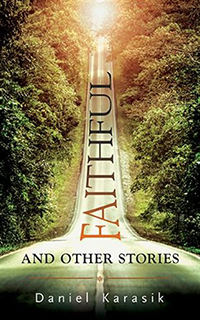Reviews
Fiction Review by John Stintzi
Daniel Karasik, Faithful and Other Stories (Oakville: Guernica, 2017). Paperbound, 170 pp., $20.
 Although Toronto-based writer Daniel Karasik has published three volumes of plays and a collection of poetry, Faithful: And Other Stories is their first book of fiction. Stories in this collection have been awarded such honours as the CBC Short Story Prize (for “Mine”), The Malahat Review’s Jack Hodgins Founders’ Award (for “Witness”), and others. Faithful is comprised of nine short stories as well as the novella “Faithful.”
Although Toronto-based writer Daniel Karasik has published three volumes of plays and a collection of poetry, Faithful: And Other Stories is their first book of fiction. Stories in this collection have been awarded such honours as the CBC Short Story Prize (for “Mine”), The Malahat Review’s Jack Hodgins Founders’ Award (for “Witness”), and others. Faithful is comprised of nine short stories as well as the novella “Faithful.”
The collection begins with the five-page story “Mine,” which takes place over a night the nameless narrator spends with her elderly, dying husband of sixty-five years. During these last hours of his life, her husband does not see her as she is, but instead recognizes her as Clara, a woman with whom he had a love affair many years before. Knowing that her husband is dying, and that he is happy to be with her again, she humours him. She lets him love her with love meant for someone else. “Mine” is a solid introduction to the collection because of the weight of its emotional core, its inherently dramatic premise, and its length. Many of the short stories in Faithful are quite short and classically constructed in that the events of the story take place through a few scenes over a short timeline. By having many of their stories take place over short periods of time, even the briefest succeed in anchoring the reader enough to feel satisfying. It’s no surprise that the efficiency of the stories’ structure feels akin to short-form theatre since Karasik has written three volumes of plays. Many of the shortest stories in the collection—like “Mine,” “A Much Loved Teacher,” and “An Old Friend”— have the tightness of one-act plays.
My emphasis on the “classic” structure of many of Karasik’s stories might suggest each story simply arrives, occurs, then departs cleanly, but this isn’t always the case. Although these stories feel very intentionally constructed, the author isn’t afraid to leave us hanging: to leave us with an evocative moment rather than a resolute one. Karasik’s story “Sister,” for instance, is an epistolary story composed of an email correspondence between a teenager in Canada and her estranged older sister (who she never knew existed) that the family left-for-lost when they still lived in Russia. The two sisters write back and forth but, at the end, don’t meet as the younger sister wants them to, and so there is no real sense of closure.
Another example is “Witness,” an almost dream-like story—calling to mind the fabulist Italo Calvino—about a young writer who goes on a walk in the middle of the night to his childhood playground. There, he meets a dog and watches a horse get beaten to death, only to later find himself locked up in a bizarre prison, having been blamed for the horse’s murder simply because he was there. At the end, we’re not quite sure where we are, only that several irreparable injustices have taken place.
You’re free, he said. And the charges? There are no charges. But the horse? We know you didn’t kill the horse. And my time? Is there no compensation for the time I’ve lost? No, he said.
The first nine stories make up only half the book, as the second half is devoted completely to the novella. “Faithful” demands more patience, but includes some of the finest passages in the collection. The first of its four parts—consisting of twenty-six of the novella’s eighty pages—is a rather slow portrayal (in third-person) of the life of a middle-aged family man who works in finance in Toronto and the affair he has with a woman who has recently had a mental breakdown. After the man’s lengthy diversion to the west coast to visit his dying father, the woman ends up killing herself, describing how she pitied this man his life in her suicide note.
While it becomes clear, through the rest of the novella—told largely in first-person accounts by characters related to him—that the intention of the long opening is to give a sense of how meaningless and dull the man’s life seems, I felt exhausted by the time I finally reached part two. In retrospect, even if this was the intent, it could have been halved and still convey a similar effect. For a collection where the bulk of its stories average less than ten pages each, the first part of “Faithful” being a third of the novella’s length jarred me. It felt like imitative fallacy gone just too far.
That said, “Faithful” did culminate into an engaging story about betrayal, religious faith, redemption, and love, and the tense relationships Karasik creates between the characters in the novella succeeded in hooking me. Even though there were places throughout some of these stories where I was pulled out of them, due to either frustration or moments that felt a little contrived, the humanity of Karasik’s characters drew me back in and kept me reading.
—John Stintzi









